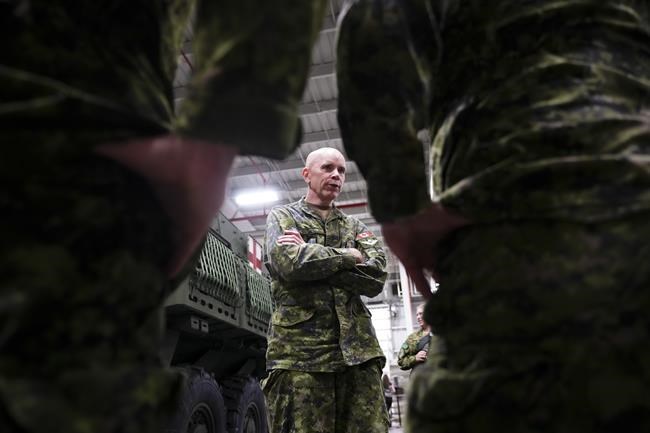OTTAWA — The chief of the defence staff said in a recent message to Canadian military members that China and Russia are expansionist powers that don't differentiate between war and peace, and that the two states are the most significant threats to the world's democracies.
Gen. Wayne Eyre released a document called a pan-domain force employment concept to Canadian Armed Forces members, which he says will form the foundation for changing the military's operations.
"We are in a time of profound change, with the world more chaotic and dangerous than at any time since the end of the Cold War," Eyre wrote in the foreword to the 45-page document.
He singled out Russia and China, saying they aim to rewrite the rules-based international order and will act "just below the threshold of armed conflict."
"The CAF will continue to respond to crises of all kinds, foreign and domestic, but our clear priorities are deterrence, defence and countering the sub-threshold actions of our adversaries," Eyre wrote.
He described the concept as a driver of change in the Armed Forces — one that "directs the implementation of a campaigning approach" — and said it will have broad-ranging implications over the course of years.
"Rather than conducting operations as discrete, reactive, episodic and relatively static activities, campaigning orients the CAF towards a holistic, proactive and sustained approach," it says.
The military has sometimes been slow to respond to hostile actions, the document says, and it calls for strengthening Canada's ability to "compete below the threshold."
It also calls for the military to integrate its operations in all battlespace domains — air, land, maritime, space and cyber — from the outset, rather than grouping them together in an ad hoc way.
Right now, the military is configured to counter overt military actions on land, at sea and by air — but other countries are adapting more quickly, the document reads.
"These authoritarian powers draw on all instruments of national power — diplomatic, information, military, and economic."
Information is being used to sow confusion, it goes on, and the military needs to work more closely with what the document calls "other instruments of national power" and other parts of government.
At the same time, climate change also increases the risk of armed conflict, it notes.
"Climate change causes humanitarian crises, intensifies competition over scarce resources and exacerbates existing problems, particularly in fragile states that are already facing pronounced economic, political and societal challenges."
The concept makes mention of evolving the Armed Forces' culture and the way the military recruits, trains and employs members.
Eyre was not made available to answer questions about the document on Thursday.
The pan-domain force employment concept notes that it is not meant to be read as a policy or strategy, but is instead intended to guide the Armed Forces as it adapts and evolves.
The military is still waiting for a defence policy update from the federal government that was initially set to be released in fall 2022.
It is not clear why the policy has been delayed, and the government has not provided a timeline for its release.
This report by The Canadian Press was first published Oct. 26, 2023.
Sarah Ritchie, The Canadian Press




